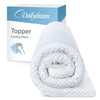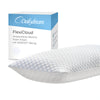Shift work and sleep: how irregular working hours endanger your health
Posted by Tobias Jaroschek on
Sleep problems due to shift work? You're not alone—but you can do something!
Shift work is an integral part of many professions—from medical personnel to industrial workers to security guards. But the price is high: the body rebels against the constant alternation of day and night shifts.
Our body has an internal clock—the so-called circadian rhythm. This not only controls our sleep and wake times, but also hormone production, body temperature, and many other biological processes. If we work against this natural clock, our entire system becomes unbalanced.
The consequences: chronic fatigue, concentration problems, metabolic problems, an increased risk of cardiovascular disease, depression, and obesity. In the long term, shift work can even reduce life expectancy.
Why is sleep so problematic in shift work?
-
Disturbed sleep-wake rhythm: The body is biologically programmed to sleep in the dark.
-
Social jet lag: While others sleep, you work – and vice versa.
Light, noise and everyday life: Sleeping during the day is difficult – children, neighbors, sunlight and appointments are natural sleep killers.
First aid for better sleep during shift work
-
Set a fixed sleep schedule: Go to bed and get up at the same time, even on days off.
-
darkness && Silence: Blackout curtains, sleep mask and earplugs are mandatory.
-
Use light purposefully: Bright light after getting up helps you wake up.
-
Healthy diet: Easily digestible food before bedtime, no alcohol or caffeine in the last few hours.
-
Use naps consciously: Power naps of up to 30 minutes can increase performance.
What employers should do
-
Ergonomic shift plans: No frequent changes, sufficient regeneration time.
-
Information services: Training on sleep hygiene and nutrition.
-
Create quiet spaces: For short breaks or power naps.
-
Culture of respect: If you're tired, you're allowed to be – open communication is the first step.
FAQ – Frequently asked questions about shift work & sleep
What is the best sleep schedule for night shifts?
Always go to bed at the same time – even on days off.
Which diet helps with shift work?
Easily digestible food, plenty of water, little sugar and caffeine.
Can you get used to shift work?
Partially – consistent shifts are better than frequent changes.
Is there any technical assistance?
Light alarms, sleep trackers, and smart apps are helpful as long as they don't cause stress.












































